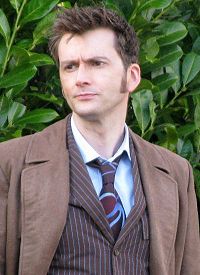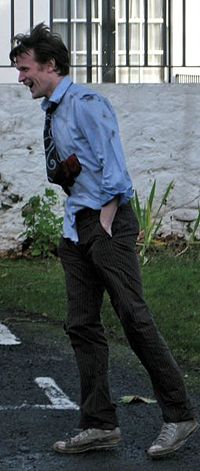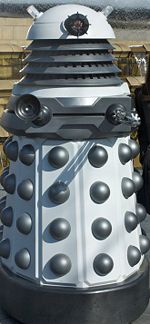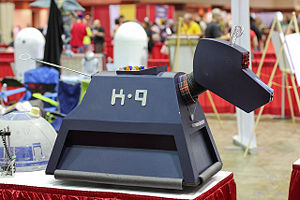User:John Stephenson/Doctor Who (2000s-): Difference between revisions
imported>Meg Taylor No edit summary |
imported>John Stephenson m (moved Doctor Who (2000s-) to Doctor Who/2000s-: duplication of material; would be better as a subpage) |
Revision as of 05:22, 18 October 2013
This is a draft in User space, not yet ready to go to Citizendium's main space, and not meant to be cited. The {{subpages}} template is designed to be used within article clusters and their related pages.
It will not function on User pages.
| Doctor Who |
| British science-fiction drama series |
| First broadcast |
| 26th March 2005 (current series) |
| Starring |
| Matt Smith (2010-) David Tennant (2005-2010) Christopher Eccleston (2005) |
| Executive producers (creative) |
| Russell T. Davies (2005-2009) Steven Moffat (2009-) |

Matt Smith has played the central character of Doctor Who since 2010, portraying the Doctor as an eccentric, professorial figure as a contrast to his youthful appearance.
Doctor Who is a British science-fiction television series which was relaunched in 2005 following its original 26-year run on the BBC, plus a 1996 television movie. On television and in other media, it features the adventures of a time traveller known as the 'Doctor', who journeys through time and space, righting wrongs and fighting injustice, often accompanied by friends known to fans as 'companions'.
The programme has lasted since 1963 partly because the Doctor, who has an alien physiology, is able to 'regenerate' himself when badly injured, allowing the lead actor to be recast. In the 'new series' (2005-), three actors have played the Doctor - Christopher Eccleston, David Tennant and Matt Smith.[1] His time machine, the TARDIS, is famously disguised as an old British police box[2] and is bigger on the inside than out; some well-known adversaries include the Daleks - mutants inside pepperpot-shaped casings - the Cybermen, and the Slitheen family.
Doctor Who has starred Matt Smith and been executive-produced by Steven Moffat since the 2010 series. Moffat took over from Russell T. Davies, who brought back the show in 2005. In 2013, Peter Capaldi was announced as Smith's successor. Currently, Doctor Who appears to have won a new generation of followers of varying ages: the UK children's magazine show Blue Peter, for example, reported that their 'Design a Doctor Who Monster' competition received the largest number of entries for any such event since 1993.[3]
History
- See 2000-2005 below for other productions prior to 2005 television series
Following the programme's 1989 cancellation and failure of a 1996 American-backed movie to secure a new series, the rights to make Doctor Who remained outside the reach of BBC programme-makers. The BBC's commercial arm, BBC Worldwide, retained an option on any future developments, but no concrete plans emerged. The return of the show in 2005 was largely due to the persistence of the then-Controller of BBC One at the time, Lorraine Heggessey,[4] who finally won the rights to the series from BBC Worldwide, backed by the Controller of Drama Commissioning at the time, Jane Tranter,[5] and Mal Young, the Controller of Continuing Drama Series until 2004 and also an executive producer for the first series of Doctor Who. The lack of support for further films had finally convinced the BBC that an in-house series was the best way to secure the future of the programme.[6]
The 'new series' retained the TARDIS and other key features of the original 'classic series', rather than being a fundamentally new spin-off. Going into production in 2004, it was executive-produced by writer Russell T. Davies and BBC Wales Head of Drama/BBC Television Controller of Drama Commissioning Julie Gardner until 2009. Davies had contributed to a range of Doctor Who novels published in the interim years, so brought a love of the programme to the new series, as well as considerable television scriptwriting experience. Davies cast the highly-experienced actor Christopher Eccleston as the Doctor, leaving the circumstances of his latest regeneration unclear. Eccleston, however, declined to appear in a second run of 13 45-minute adventures, along with a Christmas special, leading Davies to cast David Tennant as the tenth Doctor.
After four series and several specials, Davies left the programme in the hands of Steven Moffat, a frequent writer for the series, who was made executive producer from series five onwards. David Tennant having also left the series in 2009, with his final episode first broadcast on New Year's Day 2010, the fifth season of the programme began with a new actor playing the Doctor, Matt Smith. Moffat would in turn cast Peter Capaldi as Smith's successor in 2013.

The tenth television incarnation of the Doctor was played by David Tennant, from 2005 to 2010.
Characters
The Doctor
The Doctor is the main character in the series: various aspects of his character and past have been revealed, but much remains mysterious. The Doctor's real name, for example, is something he could reveal "only one time" (Forest of the Dead, 2008).[7]
In Rose (2005), the first episode of the new series, the viewer is introduced to what appears to be a leather-jacketed man of action, mid-way through a conflict with a creature known as the Nestene. It becomes clear that he is not a human being, and that he travels in time and space in a machine disguised as a 1950s police telephone box, and which is much bigger on the inside. This story also reveals that he believes himself to be the last of his own people, who were destroyed in a battle known as the 'Time War'. Throughout this season of adventures, it is emphasised that this individual is "damaged", in Russell T. Davies's words, by his experiences, which make him somewhat unpredictable.

Doctor Who's survival since 1963 owes much to the Doctor's ability to 'regenerate' into a new form, allowing a new actor to take on the role. The process also allows the character to vary somewhat in personality from actor to actor. The handover from David Tennant to Matt Smith in 2010 carried on another tradition that, while the Doctor regenerates to escape death, his clothes typically do not change with him. Here, Smith appears in the ruins of Tennant's outfit during filming of his first episode as the Doctor - and prior to the character choosing a new wardrobe.
The Doctor's physiology is rather different from humans, with its most spectacular ability being to 'regenerate' - what he calls a trick for "cheating death", as shown at the conclusion of 2005's The Parting of the Ways. With the Doctor's body fatally injured in the course of saving his companion's life, she and the viewer witness a tremendous burst of energy released from his body, and his features melt into those of a new individual - the Doctor's tenth incarnation, portrayed by David Tennant. It is quickly established that this new person is the same character, physically different and with some new personality quirks, but still the same adventurer (The Christmas Invasion, 2006), who would rather solve problems with his wits than through violence. The process occurs once more in the final episode of the tenth Doctor's era, this time shown capable of actually damaging the TARDIS as the Doctor regenerates into the form of Matt Smith (The End of Time, 2010). That story presents the process as a form of rebirth, suggesting that the previous incarnation in some way dies and is replaced by someone who is at once the same person and different. The new series is yet to indicate whether there is a limit to the number of times the Doctor can do this; in School Reunion (2006), he states that he does not age, though this may be in relation to the much shorter lifespan of a human being.
Other aspects of the Doctor's life remain less clear. Sometimes, there are suggestions of romantic feelings towards others, e.g. his companion Rose (2005-2008), but his personal relationships are never humanlike. The series does hint the Doctor is capable of such relationships, however - little is said but much implied about his encounters with historical figures such as Elizabeth I and Madame de Pompadour, as well as the enigmatic archaeologist of the future, River Song (Alex Kingston). These stand in sharp contrast to the original 1963-1989 series, where such attachments were unheard of.
The programme has given but a few hints about what family the Doctor might have had: the new series has mentioned a brother (Smith and Jones, 2007) and that he was a father (Fear Her, 2006). The Doctor's own people, the Time Lords, appeared destroyed in a 'Time War' with the Daleks, the Doctor's greatest adversaries, though the series elaborates that the War exists 'time-locked' in another realm from which it is possible to escape.
Companions
The Doctor rarely travels the universe alone, and many of his friends or 'companions' have shared his adventures over the years. Though most of the main companions in the new series have developed romantic attachments to the Doctor, it seems that his alien nature limits any desire towards them. In the 2005 series, the Doctor is initially travelling alone, but former London shop assistant Rose Tyler (Billie Piper) joins him at the close of that opening adventure, with others appearing later. Though the relationship between the Doctor and Rose is initially rocky, they come to trust and rely on each other through experience; her departure in 2006's Doomsday seemed to affect the Doctor deeply. Others at the Doctor's side included medical student Martha Jones (Freema Agyeman) and Donna Noble (Catherine Tate).
Steven Moffat introduced Amy Pond, played by Karen Gillan, initially as a young girl whose life was a mysterious time-altered jumble, with an increasing role for Arthur Darvill as Rory Williams, later Amy's husband. 2012 saw the introduction of a new companion, Clara, played by Jenna-Louise Coleman.
In terms of programme-making, the idea of having a companion is to provide a surrogate with whom the audience can identify and to further the story by asking questions and getting into trouble. It becomes clear by the 2006 series that the Doctor's new friends were not the first to join him in the TARDIS, but so far only three of his 'companions' from the past have appeared (since School Reunion, 2006, and The Sarah Jane Adventures, 2007-2011) and others have rarely been mentioned.

The Daleks are terrifying, Nazi-inspired creatures. Though the design has changed little since their first appearance in 1963, this larger-than-usual and somewhat cartoonish redesigned version of 2010 proved controversial with some fans. The front appendages include an eyestalk, interface device that uncannily resembles a sink plunger, and an exterminating weapon.
Villains
In Doctor Who, the universe is a dangerous place. A frequently occurring theme is that of various alien races attempting to conquer the Earth or otherwise threatening the human race,[8] only to be foiled by the Doctor. Perhaps the best-known example of this in the new series concerns the attempts of the Slitheen family to take over the planet and sell it for scrap (Aliens of London and World War Three, 2005). Other villains appearing include the Master (a fellow, evil Time Lord returning from the original series from 2007, played by John Simm and Sir Derek Jacobi), the Cybermen (2006 onwards) and the Weeping Angels, creatures that only exist when not being observed and which appear as lifeless statues until the observer looks away (since Blink, 2007).
Best-known villains in the series and wider UK culture are the 'Daleks', mutants inside metallic pepperpot-like casings equipped with a gun and an appendage not unlike a sink plunger. Envisaged as representing the Nazis, their best-known characteristic is frequently screaming "Exterminate!" at anything un-Dalek prior to destroying anything that gets in their way of eliminating all life other than that which is Dalek. They have appeared several times in the new series, firstly in Dalek (2005), where it appears that only one individual had survived a previous encounter with their nemesis, the Doctor - known in Skaroene lore as 'The Oncoming Storm' (The Parting of the Ways, 2005). The Daleks have made more regular appearances in the relaunched programme than in the original 1963-1989 series, returning at least once a year under executive producer Russell T. Davies, but less frequently under Steven Moffat.
Format
Episodes of Doctor Who run for about 45 minutes, except for special Christmas adventures broadcast between series. Two- and three-episode stories have separate titles for each episode, just as in 1963-6. However, whereas stories from 1963-6 are commonly referred to by overall titles (though as just noted not always the same ones), this is not usually done with the recent stories; instead they are usually named by just concatenating their episode titles, e.g. Utopia/The Sound of Drums/Last of the Time Lords. Since series two, the regular characters have had reduced roles in one or more episodes so the leads can concentrate on filming others; this led to criticism of the first 'Doctor-lite' adventure, 2006's Love and Monsters.
Music and titles
The theme music for Doctor Who, arranged by Murray Gold, is based on that of the original series's run, by Ron Grainer and Delia Derbyshire, and likewise the titles evoke those of the original. The twenty-first-century series theme and titles show the TARDIS in flight through the space-time vortex or - from 2010 - a mysterious tunnel of cloud.
Spin-offs and other adventures
2005-
The new series has seen two spin-off dramas, Torchwood (2006-2009), starring John Barrowman, and The Sarah Jane Adventures (2007-2011) starring Elisabeth Sladen with some appearances by K-9, a robot dog voiced by John Leeson. Sladen and Leeson's characters were 'companions' in the original series of Doctor Who, and were brought back in the 2006 adventure School Reunion. A third spin-off, this time starring K-9 in an independent UK-Australia co-production, K-9, first aired in 2010. The series was written by one of K-9's creators, Bob Baker, and the robot dog appeared in a redesigned form, once again voiced by Leeson.
The main character in Torchwood, Captain Jack Harkness, appeared in Doctor Who from 2005's The Empty Child onwards. The programme saw Harkness leading a team trying to prevent alien incursions via a 'time rift' running through present day Cardiff, while The Sarah Jane Adventures followed the adventures of investigative journalist Sarah Jane Smith over several series. The latter production aired on Children's BBC with an intended audience of younger fans, while Torchwood was presented as a post-9 p.m. 'adult' take on the affairs of the Doctor Who universe. Enthusiasm from children, however, later saw a cut version also broadcast. Torchwood returned for a second series in 2008, followed by a BBC Radio 4 play that year. The 2009 series comprised five episodes shown over one week. The Sarah Jane series saw both David Tennant and Matt Smith guest-star as the Doctor, and characters from both spin-offs have appeared in Doctor Who. The fifth series of The Sarah Jane Adventures and the programme itself were cut short by Sladen's death in 2011.
Several shorter adventures have also appeared as part of charity events and the Proms, a long-standing evening of music at the Royal Albert Hall. 2005 saw the immediate aftermath of the Doctor's regeneration into the form of David Tennant broadcast as part of the long-running charity event Children in Need. Similarly, a second short Children in Need adventure, Time Crash (2007), contributed to the series' continuity. The Doctor also appeared in The Music of the Spheres as part of the 2008 Proms, in an 'interactive' adventure which saw the TARDIS linked to the Royal Albert Hall via a hole in time and space through which an evil 'Graske' emerged to threaten the audience. This was the Graske's second appearance in what has become a significant run of extra adventures available on digital channels or the internet, the first being Attack of the Graske in 2005. Series two's web-only TARDISodes, which comprised short prequels to broadcast stories, did not return again, however and likewise the quiz show for young fans, Totally Doctor Who, was ultimately not renewed.
2000-2005
Prior to and following the launch of the 2005 series, the BBC licensed various companies to use characters from the series in independent projects, and also allowed full, original Doctor Who adventures to be made on audio and in print. Big Finish, for example, built up an extensive catalogue of new audio dramas featuring previous Doctors, and in 2001 secured the services of Paul McGann to reprise his role from the 1996 film. David Tennant, then an up-and-coming actor, also lent his voice to Big Finish for several different characters, long before he took the television role of the Doctor. Telos Publishing produced a range of award-winning novellas, while BBV, Magic Bullet, Reeltime Pictures and Mad Norwegian Press created their own spin-offs. The BBC also kept the programme going on-line, with three webcasts - Death Comes to Time (2001), Reel Time (2002) and Shada (2003, a remake of a never-completed and unbroadcast 1979 adventure written by Douglas Adams). These were followed by the fully-animated Scream of the Shalka (2003), featuring Richard E. Grant, who was for a time was publicised as the "ninth Doctor" prior to Christopher Eccleston's first television appearance. Grant's Holmesian Doctor was the main casualty of the series's renewal, with further adventures ruled out to avoid confusing the audience as to which "ninth Doctor" was official.
Footnotes
- ↑ BBC News: 'New Doctor actor is youngest ever '. 4th January 2009.
- ↑ In an example of how British culture has taken the programme to heart, on the occasion when London's Metropolitan Police challenged the BBC's ownership of the police box design, they lost as the court ruled that people associate such boxes with time machines rather than the police. See BBC News: BBC Wins Police Tardis Case, 23rd October 2002.
- ↑ BBC: Monster Success. 18th August 2005. The winning entry appeared in 2006's Love & Monsters as the fearsome 'Abzorbaloff'. Its creator, 13-year-old William Grantham, reportedly gave the seal of approval to the BBC's interpretation, though remarked that "it was supposed to be the size of a double-decker bus".
- ↑ Born in 1956, Heggessey was amongst the first generation of BBC executives and Doctor Who contributors who had actually grown up with the original programme. It has been suggested that this childhood love of the series, emerging as these people reached the senior ranks of the BBC, was one factor in the show's resurrection in 2003.
- ↑ BAFTA: 'In conversation with Jane Tranter'. 30th September 2008.
- ↑ Daily Telegraph: 'Doctor Who ready to come out of the Tardis for Saturday TV series' 26th September 2003.
- ↑ The character is usually referred to as 'Doctor Who' in the media, and indeed the 2005 series's end credits initially included 'Who', but the credit was changed to 'The Doctor' from the final episode.
- ↑ A guideline for the new series so far is that stories involve humanity in some way.
